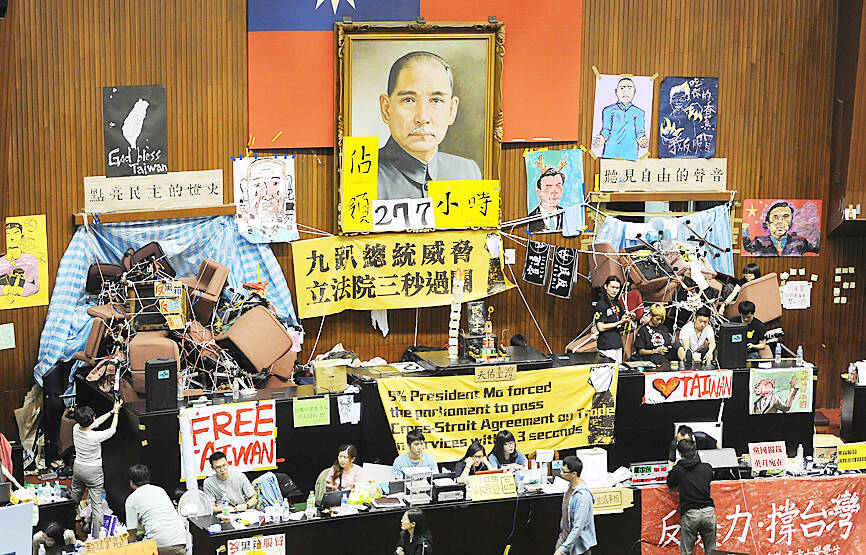A decade after the 2014 Sunflower movement, the young people who participated in the student-led demonstration have grown up, but many still carry the memories of what happened during the nearly 23-day occupation of Taiwan’s legislative chamber.
On March 18, 2014, hundreds of students and activists stormed and occupied the chamber for 22 days and 21 hours in protest a decision by the legislature, which was controlled by the Chinese Nationalist Party (KMT), to fast-track the review and approval of the cross-strait service trade agreement with China.
Protesters were concerned that increased economic integration with China would give Beijing sway over Taiwan.

Photo: Liao Chen-huei, Taipei Times
They received encouragement from the public, and hundreds of thousands of people took to the streets on March 30 in a show of their support.
The protesters peacefully left the Legislative Yuan building after then-legislative speaker Wang Jin-pyng (王金平) pledged to postpone the review of the trade pact until legislation overseeing all cross-strait agreements was passed.
The service trade deal still remains stalled in the legislature.
Meanwhile, activists from the Sunflower movement have become increasingly prominent on Taiwan’s political stage.
Taipei City Councilor Miao Po-ya (苗博雅), of the Social Democratic Party, said one of the most significant effects of the movement was an increased focus on political participation among younger people.
“In every election, the youth demographic continues to be a crucial force, because the movement was a pivotal moment in how Taiwan’s youth engaged in politics,” the 36-year-old said, adding that the voter turnout among young people had been relatively low before 2014.
Although the Sunflower movement inspired her to enter politics, she has learned the limits of what social movements can achieve, Miao said.
“Driving reform requires not only social movements, but also cooperation from the political side,” she said.
Keelung City Councilor Jiho Tiun (張之豪), of the Democratic Progressive Party, said he believes participation in the movement has given candidates like him an advantage — but just a slight one.
He ran in the 2018 and 2022 local elections and secured a seat on both occasions.
Tiun used the entertainment industry as a metaphor for politics, saying: “The Sunflower Movement was not about helping you release a solo album, it was more about getting you on a popular variety show and standing [next to the host] with a smile.”
After the Sunflower movement, the media tended to mythologize how young people had become devoted to politics, but many of those who participated are not involved in politics, Tiun added.
Hung Chun-chih (洪俊智) did not pursue a career in politics, but, like many, experienced police brutality during the protest.
Hung said he was beaten by police, and forced to disperse when they used water cannons.
“Being dispersed did not extinguish my determination to protest; it only made me more eager to support those who had also been beaten,” Hung said.
Although Hung now works at a technology company in Taipei, he always returns to his hometown in Nantou County to vote and encourages others to do so as well.
“The Sunflower movement’s biggest impact on me is that it made me care more about the development of Taiwan’s democratic society and strengthened my sense of Taiwanese identity,” he said.

A magnitude 4.9 earthquake struck off Tainan at 11:47am today, the Central Weather Administration (CWA) said. The hypocenter was 32.3km northeast of Tainan City Hall at a depth of 7.3km, CWA data showed. The intensity of the quake, which gauges the actual effect of a seismic event, measured 4 in Tainan and Chiayi County on Taiwan's seven-tier intensity scale, the data showed. The quake had an intensity of 3 in Chiayi City and County, and Yunlin County, while it was measured as 2 in Kaohsiung, Nantou County, Changhua County, Taitung County and offshore Penghu County, the data showed. There were no immediate reports of

‘DENIAL DEFENSE’: The US would increase its military presence with uncrewed ships, and submarines, while boosting defense in the Indo-Pacific, a Pete Hegseth memo said The US is reorienting its military strategy to focus primarily on deterring a potential Chinese invasion of Taiwan, a memo signed by US Secretary of Defense Pete Hegseth showed. The memo also called on Taiwan to increase its defense spending. The document, known as the “Interim National Defense Strategic Guidance,” was distributed this month and detailed the national defense plans of US President Donald Trump’s administration, an article in the Washington Post said on Saturday. It outlines how the US can prepare for a potential war with China and defend itself from threats in the “near abroad,” including Greenland and the Panama

The Chinese Nationalist Party (KMT) is maintaining close ties with Beijing, the Democratic Progressive Party (DPP) said yesterday, hours after a new round of Chinese military drills in the Taiwan Strait began. Political parties in a democracy have a responsibility to be loyal to the nation and defend its sovereignty, DPP spokesman Justin Wu (吳崢) told a news conference in Taipei. His comments came hours after Beijing announced via Chinese state media that the Chinese People’s Liberation Army’s Eastern Theater Command was holding large-scale drills simulating a multi-pronged attack on Taiwan. Contrary to the KMT’s claims that it is staunchly anti-communist, KMT Deputy

RESPONSE: The government would investigate incidents of Taiwanese entertainers in China promoting CCP propaganda online in contravention of the law, the source said Taiwanese entertainers living in China who are found to have contravened cross-strait regulations or collaborated with the Chinese Communist Party (CCP) could be subject to fines, a source said on Sunday. Several Taiwanese entertainers have posted on the social media platform Sina Weibo saying that Taiwan “must be returned” to China, and sharing news articles from Chinese state media. In response, the Mainland Affairs Council (MAC) has asked the Ministry of Culture to investigate whether the entertainers had contravened any laws, and asked for them to be questioned upon their return to Taiwan, an official familiar with the matter said. To curb repeated